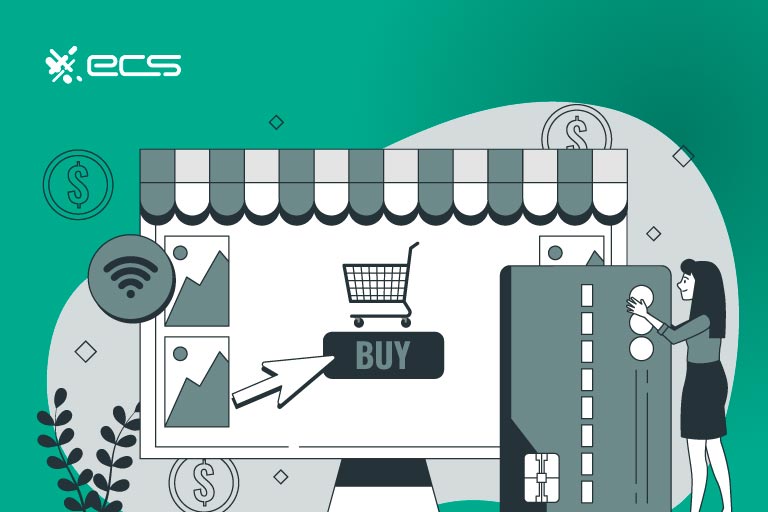Online payment processing is a core aspect of any eCommerce business. The ability to accept payments quickly and easily and with the lowest fees is what makes online sales possible.
However, even physical retail stores now have a need for at least some degree of payment processing online. Most local retail stores will have a website where customers can either order products and have them shipped or order them online for in-store pick-up.
This means that whether you plan on starting a new eCommerce business or opening a retail store, you’ll need online payment processing in both cases.
Below, we’ll go over the key details of online payment processing for small businesses and how it works. We’ll also share tips on how to best choose an online payment solution that works for your business.
What Is Online Payment Processing?
Online payment processing is the ability to accept credit cards, debit cards, and ACH (Automated Clearing House) payments via an eCommerce-enabled website.
However, accepting online payments can include other features as well, such as online invoice payment processing for service-related businesses or fundraising for nonprofits.
All of these situations require the ability to process online payments securely. To process these payments, businesses will need a merchant account.
In the next section, we’ll go over the basics of a merchant account for online payment processing.
What is A Merchant Account?
A merchant account is a type of account a business opens that gives them access to the credit card processing networks. A merchant account is different from your business bank account, and many new business owners often confuse these two types of accounts.
Your business banking account allows you to fund your business’s operations, make payments, and hold cash reserves. A merchant account only holds your electronic payment processing funds. You can then withdraw those funds to your business banking account.
The same merchant account can allow you to process credit card payments online or in person with a POS system using the same account. Although you can have separate merchant accounts if you like, it is not necessary in most cases unless the business prefers to keep its sales from various channels separate for accounting purposes or other reasons.
To obtain a merchant account, businesses will go through a payment processor, sometimes also called an acquiring bank. A company such as ECS Payments is an example of a payment processor that offers merchant accounts to businesses.

Payment Processor Application
When you are looking for a merchant account to accept payments online, you will need to contact a payment processor to start the application process.
Since having access to the credit card processing network involves a certain level of responsibility, a payment processor will have you go through a brief approval process before granting you a merchant account.
This approval process is not difficult and is mainly a confirmation process to ensure you are a legitimate business owner and your bank account is in good standing.
You don’t need to be an existing business with sales to obtain a merchant account. Although, you will need to register your business as a legal entity. This can be either as an LLC or any form of legal business entity.
If you are a new business, you will also need a business banking account. Your LLC’s articles of organization or other entity formation documents along with a valid I.D. is often all you need to open a business banking account at the bank of your choice.
Just make sure you have this account before applying for a merchant account as it will save you time during the approval process.
What You Need For the Application Process
During the application process, your payment processor will ask for basic information. This includes your business bank account details so they can be verified. They will also ask about your specific industry and the type of products you plan to sell.
You should also provide the average sale amount of your products as well as the monthly sales volumes you anticipate. It’s important to try to estimate these as closely as possible as they will have an impact on your approval as well as your fee structure.
Overall, the application process for a merchant account is rather simple. Only basic information is needed. The entire process takes only a few days and once approved, you can begin to integrate your payment system into your website to accept credit cards.
Choosing A Payment Processor For Online Payments
When you’re ready to start accepting credit cards for online payments, you will want to choose a payment processor that both understands your business as well as your processing needs.
Not all online payment processors are created equal. You’ll want to consider a few key factors when making your choice.

Customer Service
Customer service is especially important when conducting online payment processing. For a new business, setting up online payment processing can involve certain technical factors that the business owner may not be aware of or have experience with.
An experienced payment processor can help walk business owners through this process and answer any technical questions they may have when setting up their eCommerce store or integrating payments into their existing website.
A payment processor such as ECS Payments has their own in-house technical support department that can answer questions for merchants over the phone or via email. This level of personalized service can make setting up an eCommerce business much easier for new merchants.
Tools And Compatibility
Next, you’ll want to consider which tools you need for your specific type of online business as well as the different payment methods you’ll accept. This includes the types of transactions you’ll be accepting most commonly or if your business is based on a subscription or recurring business model. You may also be a service-related business and need tools focused on invoicing software or sending invoices to customers.
Gateways have tools for these options to help you get paid faster as well as increase your cash flow.
You’ll also want to consider which software you will be using. If you have already built your website, you will know which platform it is built on and what software is running the back end. If you haven’t launched the website, then this should be a consideration to make sure your payment processor offers compatibility with the software you plan on using.
Fees
Make sure your payment processor has a clearly defined fee structure that is easy to understand. You want to avoid any hidden fees or monthly fees that seem overly complicated. This can often set up a situation where it’s difficult to determine your true costs when processing with that company.
A trusted payment processor should happily explain all of their processing fees to you without trying to hide anything.
If you are processing online transactions and in-person transactions, your fees may be different for each of these. In-person transactions are lower risk and accumulate lower fees.

Online Payments And Payment Gateways
A key part of online payment processing is the payment gateway. The payment gateway is the network that handles your transactions as the data moves from your website, between the banks and card issuer, and ultimately back to your merchant account when the funds are transferred to you.
Access to a payment gateway is part of your merchant account and is provided by the payment processor.
Different gateways can work better for certain online businesses. For these types of payment processing solutions, ECS Payments can offer different gateways along with merchant accounts.
Depending on your processing needs, one gateway may work much better for your business. So having options in which gateway you use gives you access to the top payment solutions for your specific business.
Integrating a Payment Gateway With your eCommerce Website
To do any online payment processing, you’ll need to integrate your payment gateway with your website.
A common example of this type of integration is when an eCommerce store is built on one of the common platforms such as Shopify or WooCommerce.
An eCommerce platform will have shopping cart software, this is what handles the customer’s orders as they browse products and then choose to check out.
Shopping Cart Software
Your payment gateway is integrated with this shopping cart software so that when the customer enters their credit card information, that data can be safely moved between your site and the banks to get authorized.
To accomplish most basic gateway integrations, you will need to enter your payment gateway credentials into the shopping cart software.
Using the Shopify example, you would open the Shopify Payments area of your account and choose Manage. From here, you would select your third-party payment gateway. In this case, let’s use Authorize.net for this example, which is a popular gateway for eCommerce stores.

Payment Gateway Credentials
From there, Shopify will ask for your payment gateway credentials.
To access these, you will go to the Merchant Interface or dashboard for Authorize.net. Once there, you will go into the account manager and select API Credentials & keys. When this information is generated, you simply enter it into the space provided in your Shopify account.
This example focuses on Shopify, but the process of integration for most platforms and shopping cart software is very similar. For WooCommerce, you will perform the same basic process, but you will use a plugin designed for your specific payment gateway. The rest of the process is nearly identical.
Gateway APIs
All of this is possible due to the gateway’s API (application programming interface). This is a type of communication protocol that allows your website and the credit card networks to safely communicate and transfer data back and forth while authorizing purchases.
The API takes care of the technical side of things by itself. For most new eCommerce businesses, all they will need to do is make the connection between the API and their website as outlined above.
However, more complex transaction workflows and custom applications can be made by developing software around your gateway’s API.
High-Risk Online Payment Processing
Many new merchants starting an eCommerce business may not realize that the credit card industry considers certain products or services high-risk. High risk in this context means there is a history of these products or services experiencing higher rates of fraud or chargebacks compared to other industries.
Chargebacks are when a customer refutes a charge, either due to dissatisfaction with the product or service or they claim they did not authorize the purchase.
Below is a list of common high-risk products and services, although there can be more and your payment processor can let you know if your eCommerce store falls into this category.
- CBD products
- Tobacco and vaping products
- Debt reduction services
- Timeshares
- Coaching and mentoring services
- Health aids and supplements
- Firearms or ammunition
- Gambling
- E-credits or in-game virtual currencies
You can still accept credit cards and operate a successful online business if you run high-risk transactions, but you’ll need to use a payment processor that allows these transactions as well as a gateway that accepts high-risk transactions.
If your business is in a high-risk category, then you have to use a payment processor who has experience in high-risk transactions. For high-risk payment processing, ECS Payments can help you secure a merchant account.
One thing you should always avoid is processing high-risk transactions with a standard merchant account. This is fraud and you’ll ultimately lose your merchant account. You’ll also have a much harder time securing a new merchant account after closure of your previous account for fraud.
If you are in a high-risk category or other processors have turned you down, contact ECS Payments. We specialize in high-risk transactions and can help you obtain a merchant account that allows you to accept the most transactions possible with the lowest fees.

Are Services like Paypal or Square Payment Gateways?
These online payment processing platforms function as gateways for certain eCommerce businesses, however, they don’t offer businesses a dedicated merchant account.
Companies like Paypal or Square are aggregate payment processors. This means every merchant using them essentially just uses the same merchant account. All the transactions and risks are lumped together.
Downfalls to Payment Aggregators
While these may seem like good options, they have many downsides new business owners may not realize.
Restricted Industries
To begin, there are limits on what products and services you can sell with these gateways. They don’t accept high-risk transactions at all. Selling high-risk products with these gateways will lead to your account being banned and your funds possibly frozen.
High Fees
Next, the fees are going to be higher than if you had a dedicated merchant account through a payment processor. A payment processor like ECS Payments will assess your risk profile as an individual business. With Paypal or Square, you are paying for other merchants’ risks even if you are very low-risk.

Poor Customer Service
Finally, the service with these aggregate merchant accounts is often slow and outsourced to foreign call centers. This means if your account is ever closed or flagged, it’s very difficult to find a resolution quickly. While you search for a resolution, your business is unable to accept payments, which can be a disaster for a new business.
Overall, these payment platforms like Paypal are best for very small businesses or side projects. Serious businesses should consider their own dedicated merchant account through an independent payment processor. You’ll pay less in fees and have far more control over your online payment processing and business.
Most of the popular online shopping platforms such as Shopify offer access to their own payment gateway. However, you don’t have to use their gateway and for most businesses, using their own merchant account and gateway will result in lower fees and have far more tools at your disposal.
PCI Compliance For Online Payment Processing
One area of online payment processing that is extremely important is security. Handling sensitive customer and billing information requires that certain best practices be followed.
In the credit card industry, these security best practices are PCI DSS compliance.
PCI DSS stands for the Payment Card Industry Data Security Standard. These are guidelines and practices set forth by the credit card industry to ensure those processing credit cards do so in a safe and secure manner.
The guidelines will vary depending on your specific business and the amount of processing volume you do per month.
For eCommerce businesses, they can avoid having to deal with many of these issues by using tools provided by their payment gateway. For example, storing customer billing information on the gateway’s servers makes it much easier to comply with PCI DSS regulations than if you stored those locally.
Features such as hosted payment pages also make it much easier for businesses to deal with PCI compliance.
Many of the requirements for PCI DSS compliance for eCommerce businesses should be practices you already have implemented. For example, things like having an up-to-date and valid SSL certificate for your site.
Your payment processor can help you go over these details to make sure your eCommerce site is secure. Most businesses have no issue staying compliant with these industry best practices.
Start Accepting Online Payments Today
When you’re ready to start accepting online payments for your eCommerce or retail location, contact ECS Payments.
We specialize in online payment processing and high-risk payment solutions for every type of eCommerce business. We also offer personalized service and our own in-house staff of technical and payment experts who can answer your questions and make sure you have the payment solutions you need to succeed.
Contact ECS Payments today to learn more about online payment processing and how we can offer the latest in payment processing with the lowest fees for your industry.
